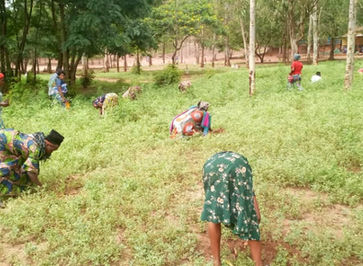
KAMANYOLA, THE DRC
Women and young people are the agents of change and working to foster community resilience in this reforestation project in the Democratic Republic of the Congo (DRC).
PLANTING PARTNER
Association Voix Libres & Local partner AFIA FEV

Kamanyola, the DRC
In the Kamanyola region of South Kivu in the Democratic Republic of the Congo (DRC), nearly a thousand vulnerable women and young people from rural areas are taking action to create a more sustainable environment. Each year, they will plant over 9000 trees to create "edible squares" of fruit trees in villages and communities in deforested and arid lands. These areas often struggle with poverty, lack of essential services, and access to nutritious food. The women and young people involved, many of whom are survivors of sexual violence, will also receive training in organic farming and reforestation. This initiative aims to improve food self-sufficiency for the local population while protecting and restoring the environment by promoting reforestation, soil restructuring, biodiversity, and a healthier world. By raising awareness of environmental protection and social ecology, this project empowers women and young people to care for the land, with those trained sharing this knowledge through solidarity networks to encourage more tree planting and promote community resilience around reforestation.
OUR IMPACTS.

18
Hectares of forest planted to date

928
Women and young people will directly benefit

9,550
Trees to plant per year
LOCAL IMPACT.

“I am happy to have learned to take care of the earth. It makes me feel good to plant trees.”
Jacqueline MWA Chentale

IMPACT ON NATURE.
The impact of global warming, land use, and pollution in South Kivu is causing significant challenges, such as drought, water scarcity, and ecosystem disruption, yet environmental protection is almost non-existent. The effects of these issues are felt by the environment and the population, leading to falling crop yields, crises, and soil degradation. Climate change is also causing disrupting seasons, which in turn causes floods, landslides, and deaths during the rainy season. This reforestation and agroforestry project will not only provide food and livelihoods for the local population, but these trees will support soil restructuring, promote biodiversity, provide shade, and stabilise weather in an area particularly vulnerable to climate change. The planted trees will also allow communities to be less reliant on existing forests, with the ecological impact of these efforts providing hope for a more sustainable future.
PROJECT IMPACT.
This project directly links environmental protection to the alleviation of suffering for some of the most vulnerable people in the Democratic Republic of the Congo. The initiative will change the lives of the initial 928 women and young people participating in the program and positively impact their 6000+ family members and the 75,000 people living in the villages where these trees are being planted. The reforested areas will help stabilise weather, encourage biodiversity, improve soil and take direct climate action in regions marred by global warming, illegal land use and pollution. Through an integrated approach of care, solidarity, schooling, training and environment protection, these women have become guardians of the earth and will preserve and protect the environment for future generations.

Project Gallery





























